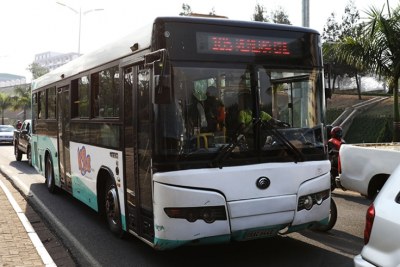-
Rwanda: Here's The Solution to Kigali's Public Transport Issues - Global Transport Expert
New Times, 20 March 2023
Chris Kost, a public transport expert working with the Institute for Transportation and Development Policy (ITDP), a global organisation that has worked with over 100 cities to… Read more »
-
Rwanda: The Rigours of Public Transport in Kigali
New Times, 4 March 2023
During the 18th National Dialogue Council, Umushyikirano, held earlier this week, from February 27 to 28, one of the key issues that came up was the issue of poor public transport. Read more »
-
Rwanda: Rwanda Needs $13bn to Boost Green Transport Sector #AfricaClimateHope
New Times, 5 February 2023
Rwanda is set to mobilise $13 billion in modernizing and greening transport sector up to 2050 according to the revised Green Growth and Climate Resilience Strategy (GGCRS) approved… Read more »
-
Rwanda: Govt to Procure 300 Buses to Ease Public Transport in Kigali
New Times, 28 February 2023
Over 300 new public transport buses will be introduced in Kigali in the next three months to ease the public transport shortage challenges that have been faced by commuters in the… Read more »
-
Rwanda: How Rwanda Will Electrify 20% Public Transport Buses By 2030
New Times, 21 November 2022
Rwanda seeks to convert 20 per cent of its public transportation to electric vehicles by 2030. Read more »
-
Rwanda: Kigali Needs Over 500 Buses to Address Public Transport Woes
New Times, 31 July 2022
There is a need for over 500 buses to help end public transport woes in the City of Kigali, Emmanuel Katabarwa, the city engineer has disclosed. Read more »
The Solution to Rwanda's Capital City's Public Transport Issues
The best way that Kigali can deal with its public transport challenges is by implementing a Bus Rapid Transit (BRT), according to Chris Kost, a public transport expert working with the Institute for Transportation and Development Policy (ITDP), a global organisation that has worked with over 100 cities to design and implement transport and urban development systems.
The BRT is a high-capacity public transport service that generally runs on dedicated lanes and corridors to avoid delays that typically slow regular bus services.
Although the characteristics of each system may vary, most BRT buses operate on dedicated lanes, allowing them to zoom past traffic and offer fast and predictable journey times. Buses only stop at designated stations where passengers typically prepay the fare before boarding, which helps streamline and speed up operations.
Services run frequently and are operated by large vehicles--often articulated or even bi-articulated buses, meaning they can carry large amounts of people quickly and efficiently.
Building a BRT is much cheaper than many advanced public transport technologies such as metro or light rail, and partly due to this, the system is enjoying growing popularity in Africa, where six systems are already operational and another 10 are under development, reports Hudson Kuteesa for The New Times.
InFocus
-
Dubbed Generation 2, the new system will feature higher IT use, improved route planning, better vehicle mix and introducing a strict scheduled service. Among the catchiest facts, ... Read more »

Passengers board buses for upcountry travel at Nyabugogo taxi park in Kigali (file photo).



